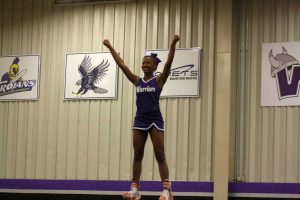Tyra Brown Stands Out

Waldorf University Cheer Captain, Tyra Brown stands out with her bright personality on and off the mat. Photo by Shannon Clark
Waldorf University Cheerleading Captain, Tyra Brown, strives to stand out for merit-based qualities rather than for her appearance.
Brown, a senior at Waldorf, experienced a somewhat divided home during her parents’ divorce. Brown’s father had custody of her brother, and her mom had custody of Brown. Through the experience, her relationship with her mother flourished.
“My mom is fabulous; she’s my best friend,” Brown said, “she’s great.”
Brown grew up in Las Vegas, Nevada. Here, she began her cheerleading career at a young age.
“I started cheering when I was 8 years old,” Brown said.
Brown’s first experience with a cheerleading team unfolded at her brother’s football practice. At the practice, cheerleaders were practicing. Although Brown insisted she had no interest in cheer, her grandmother was persistent.
“She dragged me over there, and she asked them if I could be a part of their team,” Brown said.
Regardless of Brown’s initial denial for cheerleading, she soon fell in love with the sport.
“Cheer was always there. Sometimes it’s really hard, but it keeps me active, and you have automatic friends,” Brown said. “It keeps me involved in other sports, as well.”
However, cheerleading was not the only sport Brown was involved in.
“I was involved in everything; I went to lots of sporting summer camps,” Brown said. “I did soccer, basketball, swim-team, tennis, dance, gymnastics and volleyball.”
Although sports consumed most of Brown’s downtime, she was also dedicated to Girl Scouts.
Eventually, Brown narrowed her focus to cheerleading. While cheerleading may appear glamourous from the stands, the sport demanded most of Brown’s free time.
“We would practice from 1 p.m. to 7 p.m.,” Brown said. “My team was really competitive.”
After moving to Forest City her senior year and signing with Waldorf, Brown discovered different expectations.
“I found that Waldorf College-cheer was not as strict,” Brown said. “Coaches didn’t have as high of expectations as I’ve known in the past–besides my coach this year.”
After adjusting to the new atmosphere, Brown has been able to find a place on the team.
“If you ask anybody on my team, they’d describe me as ‘extra,’” Brown said. “I stand out because of energy.”
Brown has been pointed out by several judges, because she brings a high level of energy to the competition. On the cheer team, Brown is considered the standard of “extra.”
Although Brown is largely known for her “extra” personality while competing, she has struggled with standing out for other reasons.
“It is really difficult in a white-dominant sport to be a person of color,” Brown said. “My self identifier is ‘the black cheerleader.’”
Brown was often one of two or less African-Americans on her team. In dance, the other girls wore similar colored tights to match one another. Accommodations for her skin color were evident in Brown’s eyes at a young age.
“It’s one of the things you have to live with, but it’s hard to know when you’re young,” Brown said.
Typically, teams attempt to have a uniform look amongst the team members. As the only African-American, or one of two, Brown often drew more attention from judges, coaches and the audience.
“I think it made me better, because I always got pointed out,” Brown said. “It ultimately made me better, but at the time you don’t think of it like that.”
Brown’s fiance, Derris Key, correlates Brown’s experiences with a “white-dominated team” to the person she has become.
“It’s made her diverse. She’s able to work with other people of different color, shapes and sizes,” Key said. “It didn’t change her, but it allowed her to relate to people that are different.”
Despite the additional attention and criticism, Brown remains to judge herself more harshly than her coaches.
“I’m my biggest critic,” Brown said. “There’s always a way I can be better and do better.”
Brown’s peers have experienced Brown’s work ethic first-hand.
“She’s hard working, determined and diligent,” Maggie Kretzmann said.
Her Waldorf-cheerleading career may be coming to a close in May, but Brown’s merit, ability to relate to others and sense of purpose will live on.
“It [cheerleading] gave me a sense of purpose; it gave me a sense of belonging,” Brown said. “It’s always going to be my safe place.”
